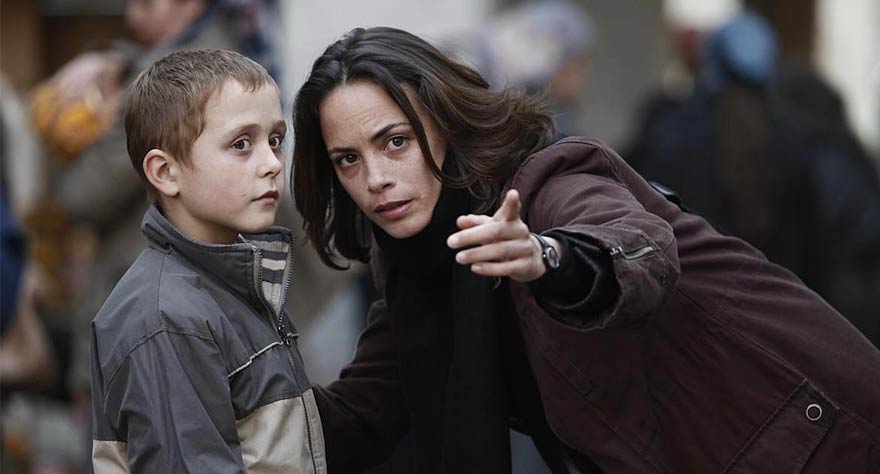
A wartime drama remake lacking in the energy its award-winning director clearly possesses.

A wartime drama remake lacking in the energy its award-winning director clearly possesses.
In 2011 Michel Hazanavicius skyrocketed to the American consciousness with the delightful and charming silent film throwback, The Artist. The film took home a shelf worth of awards, including the Oscar for Best Director for Hazanavicius and Best Film. Before that film’s premiere Hazanavicius had been mostly working in the same feather-light register with the OSS 117 films. All of this is to say that there must be something rather intimidating about that Oscar looming down from the mantle, because the latest effort from the director is the bruising Chechen War film, The Search.
The Search—inspired by the 1948 film of the same name—takes place in 1999 during the outbreak of the Second Chechen War and opens with a found footage style video made by a Russian soldier that shows the senseless murder of a mother and father. Following the title credits we meet the near-mute 9-year-old, Hadji (newcomer Abdul-Khalim Mamutsjev), who takes his baby brother and flees only to wind up in an orphanage for Chechens run by Helen (Annette Bening). When Hadji can’t stand the presence of so many guns, he sneaks away and is taken in by Carole (Berenice Bejo–teaming up with Hazanavicius again), a non-governmental aid worker trying to get foreign attention for the conflict, and the two become a quick family.
While Hadji’s story is the core driving force of the narrative, two other plot lines are woven in to complete the picture from the opening scene. Kolia (Maksim Emelyanov) is a Russian teenager arrested for smoking pot on the streets of Perm and forced to join the army. His timid nature makes him the whipping boy for the rest of the new soldiers, as well as for the higher-ups, until little-by-little he is broken down and rebuilt by the horrendous monstrosity that is the film’s depiction of the Russian army. The third plotline follows Raissa (Zukhra Duishvili), Hadji’s sister, who is desperate to find her younger brothers. It is this thread, by a long shot, that gives the film much of its burdensome feel.
The essence of the film rests upon Mamutsjev’s shoulders as the young Hadji scrambles to stay alive and cope with his loss while still being a 9-year-old boy. For a large part of his screen-time, Hadji stays mute, and Mamutsjev and Hazanavicius use this silence to heartbreaking effect—mostly early on in the film. Bejo’s (The Artist, The Past) Carole is Hadji’s opposite, a neurotic and fast paced NGO worker who can hardly stop talking. The resulting relationship quickly becomes the emotional core of the entire film.
For the most part, the rest of the cast turns in similar work. Emelyanov is utterly convincing as he seemingly grows hollow and distant and then completely detached over the two-hour plus run time. The notable exception is the normally solid Bening (The Kids Are All Right, American Beauty), who instead of seeming exhausted and rundown by her tireless work, just feels lifeless.
The fact of the matter is, this film is likely a necessary one; how often has a Chechen War found its way into American cinemas? And in Chechen and Russian no less? The stories here are powerful, and, as exemplified by Carole’s interview subjects, by no means unique. The utter confusion and senselessness run rampant.
But that doesn’t stop the movie from stretching its net too wide and becoming overwrought. Much like the heavy-handed early films of this year’s Best Director winner, Alejandro Gonzalez Inarritu (21 Grams, Babel), it’s easy to spot the connections between the seemingly random narratives early on. So, while the mass cold shoulder from the rest of the world, and the horrific human rights abuses that occur carry some sickening heft, Hazanavicius piles it on until characters basically start speaking to the audience— “It’s about understanding they’re alive and they have a right to a better life.” But perhaps this gets at the point. These tragedies undoubtedly do pile up, and back in the day the international community couldn’t be bothered to raise so much as a finger in support of Chechnya. But the film gets lost in its frustration, buried so deep that the proceedings starts to feel laborious, and even the pockets of hope and joy hardly resonate.
Somewhere in this overlong film is a very good and rather important story about the way the world can steal our home and how we still have to find ourselves in the mess; about the unspeakable tragedies that can’t continue going ignored; about how we lose our humanity, and how we find it again. In many ways it feels as though The Searchwas directed by a first-time director, lacking in that effervescent touch Hazanavicius brought to The Artist with such authority.
The Search is out in limited release in Canada today, March 13.